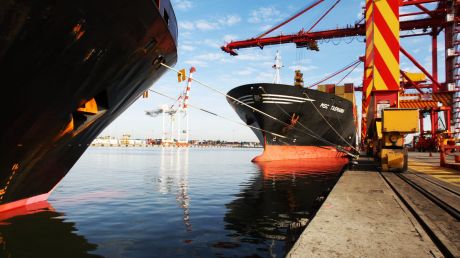
Trade surplus walloped by Cyclone Debbie
Australia's trade surplus collapsed in April as damage wreaked by a massive cyclone in Queensland almost halved exports of coal.

Australia's trade surplus collapsed in April as damage wreaked by a massive cyclone in Queensland almost halved exports of coal.

OECD names house prices as the biggest domestic threat to Australia's economic growth.

Australia has broken the record for the longest run of uninterrupted growth in the developed world, figures released by the Australian Bureau of Statistics have revealed.

Treasurer Scott Morrison has warned the economy's future is not yet secure as Australia prepares to stumble across the line on Wednesday to grab the world record for the longest period of consecutive growth.

It looks like déjà vu all over again for Scott Morrison as he fears another weak gross domestic product figure on Wednesday.

The Reserve Bank of Australia has left the cash rate at a record low 1.5 per cent for the 10th consecutive month.

A review into the people and processes of the ATO following the alleged abuse of position by one of its highest ranking officers is "inevitable", Inspector-General of Taxation Ali Noroozi says.

Australia's current account deficit narrowed to its smallest in more than 15 years last quarter courtesy of surging prices for its major resource exports, providing a bulwark for the country's endangered triple-A credit rating.

There are clear signs that the consumers who have driven much of Australia's growth are running out of puff.

Revealing the secret identifies behind shell companies and opaque trusts is the "new frontier" in fighting tax evasion, says the OECD's head of tax Pascal Saint-Amans.

Company profits grow 40 per cent while wages grow 0.9 per cent

Australians are some of the most pessimistic in the world, with seven out of 10 believing their kids will end up worse off than they are.

Job advertisements rose for a third straight month in May, a promising sign for continued labour demand even as official figures on employment remain patchy.

Market bets on an interest-rate cut by the end of this year have doubled in the past month.

The World Bank has maintained its forecast that global growth will improve to 2.7 per cent this year, citing a pick-up in manufacturing and trade, improved market confidence and a recovery in commodity prices.

It's too early to be sure, but not too early to suspect that, if we and the other developed economies keep travelling the way we are, conventional wisdom about what constitutes good economic policy may soon need to be turned on its head.

No-one ever got rewarded for putting the economy into recession.

We won't go cashless, but we could see limits and restrictions on cash transactions, says Black Economy Taskforce chairman Michael Andrew.

How do you battle perceptions that girls are bad at maths and science when the people telling you that may be your family?

There's nothing like losses to focus an investor's mind.

One of the most significant, but least remarked upon, features of this year's budget is Malcolm Turnbull's decision to greatly expand the government's involvement in the construction of public infrastructure.

There's nothing like a prominent visiting economist spruiking imminent ruination to get plenty of media attention.

The Treasurer has begun preparing the ground for weak or negative economic growth in the March quarter.

McDonald's is considering whether it will need to restructure its operations to avoid getting hit by Diverted Profits Tax.

Unemployed draftsman Michael Dempsey wants a piece of the multibillion-dollar infrastructure boom that's happening around him, and he's making himself impossible to ignore.

Australian house prices fell in May for the first time in 18 months, in an early sign lending restrictions are starting to damp demand.

Australian retail spending rose 1 per cent in April, beating market expectations of a modest rise.

Australia is experiencing a "spectacular housing bubble", which needs to be addressed with tougher regulatory measures, said Willem Buiter, Citigroup's chief economist.

The obvious major missing ingredient in Scott Morrison's 'backflip' budget was the lack of actual tax reform - but there is another glaring black hole. Turnbull's leadership remains weak as long as he's unable to convince his backbenchers that it's OK to come out from under the lump of coal now, that we can move on from Abbott's whatever-it-takes.

The apparent end of the housing boom looks set to hit the employment market, with analysts betting the number blue-collar jobs being advertised will soon drop off.

Less time chatting and socialising means more time working and churning.

There are advantages it is hard for small businesses to ignore.
Save articles for later.
Subscribe for unlimited access to news. Login to save articles.
Return to the homepage by clicking on the site logo.